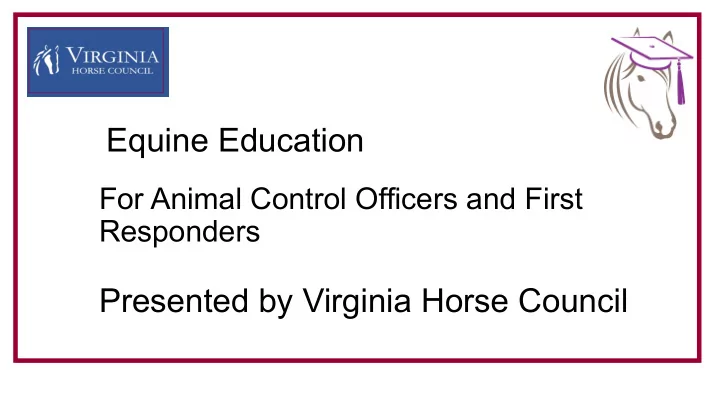

Equine Education For Animal Control Officers and First Responders Presented by Virginia Horse Council
Equine Welfare Task Force • Education committee • Dr. Abby Sage, DVM – State Veterinarian • Jamie Bennett, Culpeper County Animal Control • Sue Fanelli – Eq-Knowledge, Training Developer • Tasked with creating educational opportunities for ACOs and First Responders to promote awareness and safety
Equine Handling and Welfare • 3 module course, 8 hours • CEUs will be available • Most specific to ACOs, but can be applicable to all first responders, especially Section 1 • Designed to be dynamic and hands-on
Section 1: Equines and Equine Handling • Applies to all equines: Horse, Donkeys, and Mules • In this module we will address: • Animal Control/First Response and Horses • Managing Stressful situations • About the horse • Safety • Approaching • Catching and Leading
Section 1: Equines and Equine Handling • Hands-ON! • Some beginning lecture, then work with horses • Approach, halter, lead • “Snow fence” corral
Section 2: Welfare Assessment In this module we will address: • General living conditions • Body Condition Score (BCS) • General overall health issues • Feet • Teeth • Eyes • Infectious Disease • Parasites • Colic • Cushing’s Disease
Section 2: Welfare Assessment • HANDS ON! • First part lecture, then outside! • On the host farm, we will look at and discuss general living conditions • Several horses hands-on BCS • Several horses feet, teeth, eyes • Discussion about diseases and parasites
Section 3: Nutrition • In this module we will address: • The equine digestive system • Basic diet requirements • Types and quality of forage • Grains and commercial concentrates • Supplements • Actions for ACO/first responder
Section 3: Nutrition • HANDS ON!! • Lecture will include hands-on look at different types of hay and feed – both good and not-so-good. • Tour of host facility to look at forage, pastures, supplements, etc.
What should you do? • Each module specifically addresses the actions for ACO or First Responder • Includes calling for veterinary or LE assistance as required
The Launch!! • First class scheduled for November 13, 2019 in Culpeper • $20 to participants • Lunch provided • Sue Fanelli lead presenter • Dr. Jennifer LaPlume veterinarian • Chief Doug Monoco (LFVFR) TLAER presenter
Virginia Horse Council and EQ-Knowlege present : Equine Education for Animal Control Officers and First Responders The Commonwealth of Virginia is home to over 180,000 horses, mules and donkeys. Over 500 were seized or surrendered to Animal Control in 2018, and Large Animal Rescue happens frequently. This 8-hour class provides hands-on horse handling and welfare assessment instruction for ACOs and other First Responders to increase awareness and skill working with these large animals. Class is $20 for ACOs and First Responders, and participants will receive 8 CEU credits for attendance. 8 AM – 5 PM, November 13, 2019 8021 Olympic Way, Culpeper, VA 22701 FEE: $20 includes course materials, certificate and lunch SPACE IS LIMITED to 16 participants! Pre-registration required Contact Reney Stanley to register at 888-467-7382 or info@virginiahorsecouncil.org
Onward to 2020 • Goal is to have 4 additional classes in varied locations throughout the Commonwealth • Classes held on week days, not weekends
Onward to 2020 • Need to find venues, preferably rescues so that participants can see lower BCS • Need to secure local veterinarians to assist and also meet participants • Need volunteers to assist with some of the hands-on pieces
…and Beyond • Develop a contingent of trainers throughout the Commonwealth who can deliver the training • Provide training annually at several different locations • Provide training as part of initial training for ACOs
What can you do? • If you can host a class, please let’s arrange! • Help with logistics, horses, equipment…. • Help obtain funding to keep this low-cost for officers • Horse Council Foundation is a 501c3 • Spread the word! We would love to have the AC community working with us
What do we need? • Rope – about 15’ per person • Halters – different types • Lead lines/shanks • Treats • Buckets • Construction fence • Hoof picks • Various hays – good and bad • Straw
QUESTIONS
Recommend
More recommend